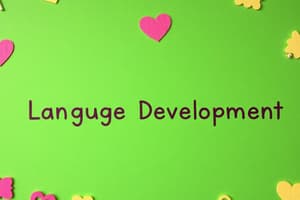Podcast
Questions and Answers
What is prelinguistic communication?
What is prelinguistic communication?
Communication that involves infantile noises and gestures to request objects.
When should early intervention in speech and language development ideally begin?
When should early intervention in speech and language development ideally begin?
- When the child is of preschool age
- During the first few months of life (correct)
- Between the ages of 12 and 18 months
- In kindergarten
The loss of the ability to speak is typically more disabling than the loss of the ability to use language.
The loss of the ability to speak is typically more disabling than the loss of the ability to use language.
True (A)
Which one of the following is an example of an alternative question-asking strategy?
Which one of the following is an example of an alternative question-asking strategy?
What is decoding?
What is decoding?
Students with language disorders tend to express themselves clearly in writing.
Students with language disorders tend to express themselves clearly in writing.
What do speech-language pathologists measure to document outcomes based on individual intervention plans?
What do speech-language pathologists measure to document outcomes based on individual intervention plans?
Which of the following statements about communication variations is true?
Which of the following statements about communication variations is true?
According to typical development, by what age are all American English speech sounds acquired?
According to typical development, by what age are all American English speech sounds acquired?
Language development is easily separated from social and cognitive development.
Language development is easily separated from social and cognitive development.
Language disorders are generally classified according to which two dimensions?
Language disorders are generally classified according to which two dimensions?
What does specific language impairment refer to?
What does specific language impairment refer to?
A failure of the child to understand the sound system of language represents what?
A failure of the child to understand the sound system of language represents what?
What is lisping?
What is lisping?
What percentage of children and adults in this country are considered stutterers?
What percentage of children and adults in this country are considered stutterers?
What is dysarthria?
What is dysarthria?
Communication requires which of the following?
Communication requires which of the following?
What is language?
What is language?
What is receptive language?
What is receptive language?
What does phonology refer to?
What does phonology refer to?
A language disorder that involves problems with functional and socially appropriate communication is referred to as?
A language disorder that involves problems with functional and socially appropriate communication is referred to as?
All of the following are examples of speech disorders EXCEPT?
All of the following are examples of speech disorders EXCEPT?
Approximately what percentage of children identified for special education receives services primarily for speech or language disorders?
Approximately what percentage of children identified for special education receives services primarily for speech or language disorders?
Approximately what percentage of students in elementary and secondary grades is thought to have speech disorders?
Approximately what percentage of students in elementary and secondary grades is thought to have speech disorders?
Flashcards are hidden until you start studying
Study Notes
Prelinguistic Communication
- Example of prelinguistic communication includes infantile noises and gestures used by young children to express needs.
Early Intervention
- Early intervention in speech and language development is ideal during the first few months of life.
Communication Challenges in Adults
- Loss of the ability to speak is often more disabling than the inability to understand language.
- Individuals with severe disabilities may need alternative or augmentative communication systems.
Question-Acquiring Strategies
- An example of an alternative question-asking strategy is reducing the complexity of a question.
Decoding Defined
- Decoding is the ability to convert written words into spoken language.
Written Language Development
- As students progress in grades, the significance of written language increases, with mastery of the alphabetic system being crucial.
Measuring Functional Communication
- Speech-language pathologists assess outcomes through demographic data and scales measuring functional communication.
Language Differences
- A language difference becomes a disorder when there is difficulty communicating, even within one's own language community.
Typical Language Development Milestone
- All American English speech sounds are typically acquired by age eight.
Pragmatic Theory of Language Development
- Pragmatic theory posits that language development is influenced by arranging natural environments for effective language teaching.
Classifications of Language Disorders
- Language disorders are categorized by domain and etiology.
Specific Language Impairment
- Specific language impairment refers to language disorders that have no identifiable cause.
Phonological Disorders
- An inability to comprehend the sound system of a language at an age-appropriate level is indicative of phonological disorders.
Articulation Disorders
- Lisping is an example of an articulation disorder.
Stuttering Prevalence
- Approximately 1% of children and adults in the U.S. are classified as stutterers.
Dysarthria
- Dysarthria is a speech disorder resulting from brain damage affecting respiratory support for speech.
Essential Components of Communication
- Effective communication involves encoding and decoding messages.
Definition of Language
- Language is the system of symbols used to convey ideas following specific rules to determine meaning.
Receptive Language
- Receptive language refers to the ability to decode and understand messages.
Phonology
- Phonology involves rules regarding sound combinations in language.
Pragmatics in Language Disorders
- Language disorders affecting social communication and functional use are categorized as pragmatic disorders.
Speech Disorder Categories
- Semantic disorder, which deals with meaning, is not classified as a speech disorder.
Special Education Services
- About 20% of children identified for special education services receive support primarily for speech or language disorders.
Prevalence of Speech Disorders
- Approximately 5% of students in elementary and secondary grades are believed to have speech disorders.
Studying That Suits You
Use AI to generate personalized quizzes and flashcards to suit your learning preferences.




